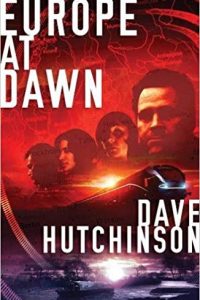Stefan Dziemianowicz reviews Joe R. Lansdale
Like the pulpsmiths of yore, Joe R. Lansdale writes in a wide variety of genres. Unlike the pulpsmiths of yore, there is nothing at all generic about his writing. He’s the perfect example of the writer whose work is sui generis. Whether you read a story of his in a crime fiction magazine, a horror anthology, or a collection of western tales, you don’t think of it in terms of the market – you think of it as a Joe Lansdale story.
Lansdale’s latest collection, Bleeding Shadows, features 21 stories and nine poems. It’s the biggest collection of his work produced to date and his most creatively varied. Only about half of its selections are weird or fantastic in nature, but anyone who likes that side of Lansdale’s writing will enjoy the others. Especially notable is ‘‘The Stars Are Falling’’, a tale that has been reprinted in dark fantasy and mystery story anthologies, even though it doesn’t really fit either genre. It’s a beautifully understated tale about a soldier returning home from World War I and trying to reconnect with his wife and child whom, he is pained to realize, he doesn’t really know anymore. There are surprises at the end, but not the kind that you find in a work of genre fiction. This story would not have been at all out of place in the New Yorker or Atlantic Monthly.
Lansdale has written period westerns, notably the novel The Magic Wagon, and he can write wild west shoot-’em-ups with the best of them. Two stories in this volume, ‘‘Soldierin’’’ and ‘‘Hide and Horns’’, are episodes in the life of a nameless black cavalry soldier who gave rise to the legends that fueled dime novels about The Black Rider and Deadwood Dick. Though Lansdale describes them as warm-ups for a western historical novel he hopes to write, their occasionally raunchy banter and frank handling of racial themes will remind readers of his mystery novels featuring contemporary crime-solvers Hap and Leonard.
Lansdale is as well known for his crime fiction as his weird writing and there are several prime examples of it on display here: ‘‘Six Finger Jack’’, a brutal hard-boiled tale; ‘‘Old Man in the Motorized Chair’’, a gentle spoof of the armchair detection techniques of Sherlock Holmes, Nero Wolfe, and company; ‘‘Santa at the Café’’, a biter-bit tale of escalating double-crosses and betrayals; and ‘‘Shooting Pool’’, a slice of grim Texas noir. The latter features a passage that’s a fine example of how Lansdale is able to convey powerful emotion through his economic, plainspoken prose. Near the story’s end a young man is forced at gunpoint to haul up the corpse of a man who has just been shot through the head, and he notes,
Ross’s eyes were wide open, and I saw then that everything he had been or might have been, all of his plans and memories, dreams and schemes, they had fled, out through the hole in the back of his skull, across the floor in a puddle of blood and brain fragments, a piece of his skull…. Looking at him, in that moment, I knew there was nothing beyond our time on earth, that dead was dead, and I had never wanted to live more than I did at that moment with my eyes locked on Ross’s face.
Given his facility with both crime and horror fiction, Lansdale also is good at splicing the two together. ‘‘Dead Sister’’ begins as a conventional detective tale but quickly takes a turn for the weird when the detective discovers that the suspicious character he has been asked to keep under surveillance is a grave-robbing ghoul. In the title tale, a guitarist modeled somewhat on blues great Robert Johnson, and an unorthodox detective, sent by his sister to protect him, struggle to outwit and outrun a Lovecraftian hellhound on his trail.
The remaining fantastic fiction is a real potpourri ranging from the absurdist fantasy of ‘‘Mr. Bear’’, about the unwanted friendship that develops between a man and Smokey the Bear (who proves to be a little more unsavory than his public image would suggest); to ‘‘What Happened to Me’’, an excellent haunted house tale whose haunt proves to be not just your average ghost; and ‘‘The Folding Man’’, which begins like a comic tall tale before detouring sharply into hardcore horror. ‘‘Torn Away’’, a Twilight Zone-type tale about a reanimated dead man being stalked by his shadow, and ‘‘Quarry’’, a tribute to Richard Matheson’s classic ‘‘Prey’’, both feature characters trying to outrun supernatural pursuers, a theme that pops up frequently in Lansdale’s fiction. There’s a pair of zombie stories better than most – ‘‘A Visit with Friends’’ and ‘‘Christmas with the Dead’’ – and a quasi-science fiction story, ‘‘Star Light, Eyes Bright’’. ‘‘Metal Men of Mars’’, a tribute to Edgar Rice Burroughs’s John Carter of Mars series, captures the spirit of Burroughs’ interplanetary swashbucklers and sends John Carter on an adventure a little more extreme that Burroughs could have imagined. (It would make a much better movie than was made from A Princess of Mars.)
Nobody does weird mash-ups like Lansdale does and the book’s closing tale, ‘‘Dread Island’’, is a conflation of ideas and themes from Mark Twain, Lovecraft, and Uncle Remus (the ‘‘Song of the South’’ version), with nods to Peter Pan and the legend of Amelia Earhart. In this continuation of The Adventures of Huckleberry Finn (Huck is still grousing about the writer who wrote up his life and made money off of it), Huck and Jim boat out to a legend-haunted island that appears magically in the Mississippi on the first night of the full moon to rescue Tom Sawyer and a friend. The island is home to the animal characters from the Uncle Remus stories, and it turns out that Br’er Fox has gotten ahold of the Necrnomicon and is summoning Cthulhu (here written as ‘‘Cut Through You’’). Lansdale perfectly captures the cadences of Twain’s homespun storytelling style, and it’s amazing how well it suits the story’s outrageous plot. (Of Cthulhu, Huck says, ‘‘It had its head poking all the way through, and that head was so big you can’t imagine, and it was lumpy and such, like a bunch of melons had been put in a tow sack and banged on with a boat paddle.’’) It’s as though, having shown the reader his versatility as a writer in the 29 selections that precede it, Lansdale tried to condense every genre he’s written for into a single story that is remarkable for its comical audacity.







